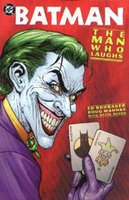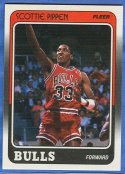Just looking at the boxes makes my inner collector scurry into the shadows. And as I think about all the money, all the time, all the energy I spent hunting down these items only to hide them in plastic and cardboard boxes, my inner collector hides further in the darkness. To me, the items inside those boxes have become insignificant. They’re unimportant because they’re hidden. They’re hidden because they’re unimportant.
So I take the thought one step further. “Maybe it’s time to sell of some of this junk,” I think.
When I get a response, I know the debate has begun. “If it’s the clutter you’re worried about,” my inner collector says in a whisper, “keep in mind that you’ll have room when you move to a bigger house next summer. So don’t fret just yet.”
I nod in understanding. “Yeah, that’s true,” I say, not totally believing the fact, but I’m willing to concede that point. “But why do I need all of this stuff? I’d be better off just getting rid of it all. It’s not like it’s really valuable.”
The inner collector gasps as if from a physical blow. “Oh, but it is,” he says softly. “It is. You’re just not done, yet. The collection is incomplete. Just imagine how much more valuable and how important it’ll be when you’re done.”
I start flipping through a box of comics. Random issues of books I don’t collect. I find two issues I don’t remember buying. “Why did I buy these?” I ask. “I should get rid of ‘em.”
In response, all I hear is, “Check eBay.”
And I do. I do a search on those issues to see how much they generally sell for. And that’s exactly what my little deceiving friend wants me to do. It’s a trap. Because what I find, no matter what issues I type in, is that either they are valuable and thus worth saving, or they’re not selling for enough to make it worth the time and energy it would take to sell them.
So what do I do? I start to hunt for more. What if I added to the set? What if I had the five issues that preceded them? Would that make them more valuable?
His job done, my inner collector moves completely into the shadows. Unaware of his departure, I search for more insignificant comics to add to my already insignificant collection.
Although I have done so in the past, I generally don’t buy anything in that situation. But that wasn’t my friend’s goal. No, he simply wanted to divert my attention. He wanted to avert the danger and ensure that my collection stayed intact.
He’s usually successful. But not always.
 Last week I managed to pull out 65 comics written by Ed Brubaker and put them up for sale. It wasn’t an easy task. About two years ago I decided I was going to collect every comic written by Brubaker. And why not? He’s one of the biggest talents in comics today. But as I found more and more reading material I was interested in, I decided buying those old Brubaker books just wasn’t worth it. Still, I kept up with his current books for years. When I didn’t pre-order the Captain America special hitting the stands this month, I knew the Brubaker shipped had sailed, which meant that those books I did buy were part of a collection I’d never finish, and thus they were just taking up space.
Last week I managed to pull out 65 comics written by Ed Brubaker and put them up for sale. It wasn’t an easy task. About two years ago I decided I was going to collect every comic written by Brubaker. And why not? He’s one of the biggest talents in comics today. But as I found more and more reading material I was interested in, I decided buying those old Brubaker books just wasn’t worth it. Still, I kept up with his current books for years. When I didn’t pre-order the Captain America special hitting the stands this month, I knew the Brubaker shipped had sailed, which meant that those books I did buy were part of a collection I’d never finish, and thus they were just taking up space. Most of the books aren’t even worth cover price, so there’s no need to keep them. But as I stacked them up and made a list, I second guessed myself. Maybe I should keep them after all. What’s the point of getting rid of them? Sure, most I’ve never read. Sure, they’ll never be valuable. And sure, the good ones I have in trade paperback form. But does that mean I really need to sell them?
I hadn’t looked at a single one of these books since I bought them. They’ve been hidden from the harsh light of day in short comic boxes. So why was I struggling when it came time to sell? I’ll never miss them when they’re gone, but holding them in my hands, soaking in those cover images, and feeling the slick Mylar brought back memories of how important they were when I bought them.
Knowing that I was about to sell them so I’d never see them again felt like I was selling my children into slavery. As if I’ve picked out my least favorite children and I was sending them off to be slaughtered.
I sold them to someone on the Collector’s Society forum. A very friendly man named, Bob. I didn’t really know the guy at the time. I just knew he was a comic fan like me. But was he really like me? For all I knew, he was a smoker with eight cats running around, laying on top of his comic boxes. Hell, maybe he reads his comics while eating Big Macs. I couldn’t put my pretties into an environment like that, could I? Not in good conscience anyway. And what if he reads them? What if those perfect spines end up with creases and those perfect covers end up with finger prints or other smudges? The thought made me hesitate; made me want to hide them away again for all eternity.
So as we haggled over a price that worked for both of us, I always felt on the verge of pulling the plug on the deal. They were worthless, but they were worth so much more than the asking price. But in a surge of strength rarely seen, I sent him an email and agreed to the terms: $65 shipped. A dollar a book. (Just admitting that makes my body spasm. What a mistake. I’m probably better off with the money and the space the sale affords me, but inside, I know it was still a mistake.)
I remember what I was thinking as I stood in line at the post office. These were the last few moments I’d get to spend with those comics. I was at the point of no return. Once the clerk put that stamp on the box, those comics would no longer be mine. When I walked out empty handed, my final thought was, “What if those books that are worthless right now actually become valuable? Sure, these comics mean next to nothing now, but what if, now that they’re gone, they become a hot item? How could I live with myself after that?”
 This crazy notion that what is worthless today might be very valuable tomorrow started in 1990. A year earlier, I entered a drawing at the local hobby shop, Hob Nob’s, and won a set of 1988-89 Fleer basketball cards. Not caring a bit about basketball or its players, it probably wasn’t the best prize, but it was a prize nonetheless, so I cherished it by hiding it in the bottom dresser drawer.
This crazy notion that what is worthless today might be very valuable tomorrow started in 1990. A year earlier, I entered a drawing at the local hobby shop, Hob Nob’s, and won a set of 1988-89 Fleer basketball cards. Not caring a bit about basketball or its players, it probably wasn’t the best prize, but it was a prize nonetheless, so I cherished it by hiding it in the bottom dresser drawer. I held onto the cards for about a year; until the day I noticed a 1990 Ghost Rider #1 displayed on the wall behind the counter. It was gorgeous. It was the hottest book according to Wizard magazine, and it was only going to get more valuable. Everyone wanted it, including me. I had to have it. But unfortunately, I didn’t have the $20 to get it. Or did I?
Every time I went into that shop (which was about once a week), I eyed that comic. I wanted it so bad. It never crossed my mind that I could stop buying the weekly comics for a month and save up for that one issue. No, instead, I’d ring up my comics or baseball card purchase and leave with a sad glance over my shoulder at that comic on the wall.
One day, that all changed. The shop had just received an issue of Beckett Basketball Card Magazine. As I waited to pay for more comics that weren’t that Ghost Rider, I flipped through the price guide and found the 1988-89 Fleer set. It was holding steady at $30. The same value it had when I won it a year earlier. “Heck, if it’s still the same price it’ll never go up,” I thought. “I should trade it for that Ghost Rider. If I don’t do it now, it’ll be more expensive and I’ll never get it.”
I ran home and grabbed the set. Back at the shop a half an hour later, I stood at the counter, pointing to the Ghost Rider. After almost no wheeling and dealing, I made the trade: my cards and $5 for his comic. I was so excited. It was the first time I spent more than ten bucks on a comic. And it was awesome. I would never open the thing, I had to keep it mint and in its bag. But I could enjoy the cover. I knew that it would be well worth the $20 trade. And probably be worth $100 before the summer was over. What a great investment.
I stuffed it in a box.
Time went on.
Less than 90 days later, a new basketball card price guide came out. That Fleer set was now worth $100. The Pippen rookie alone was worth more than that Ghost Rider. That set continued to gain in value, while the comic started to fall. Every time I looked at that comic, I felt a little more disgusted. How could I have made such a colossal mistake? Year later, when I sold a box of 300 comics—of which Ghost Rider #1 was included—for $30, I felt that despair for the last time.
Thinking about Bob enjoying those Brubaker books is no longer a bad thing. Sure, part of me regrets the sell, but I’m happy that another fan is reading those comics and getting some enjoyment out of them. So for now, I’m happy with the transaction. My friend in the shadows might not agree with me, but he knows how to choose his battles, and I’m sure someday, somewhere down the line, we’ll revisit this little sale and debate its merits. I just hope those comics don’t start creeping up the hot list, because if they do, I won’t have a leg to stand on.
No comments:
Post a Comment